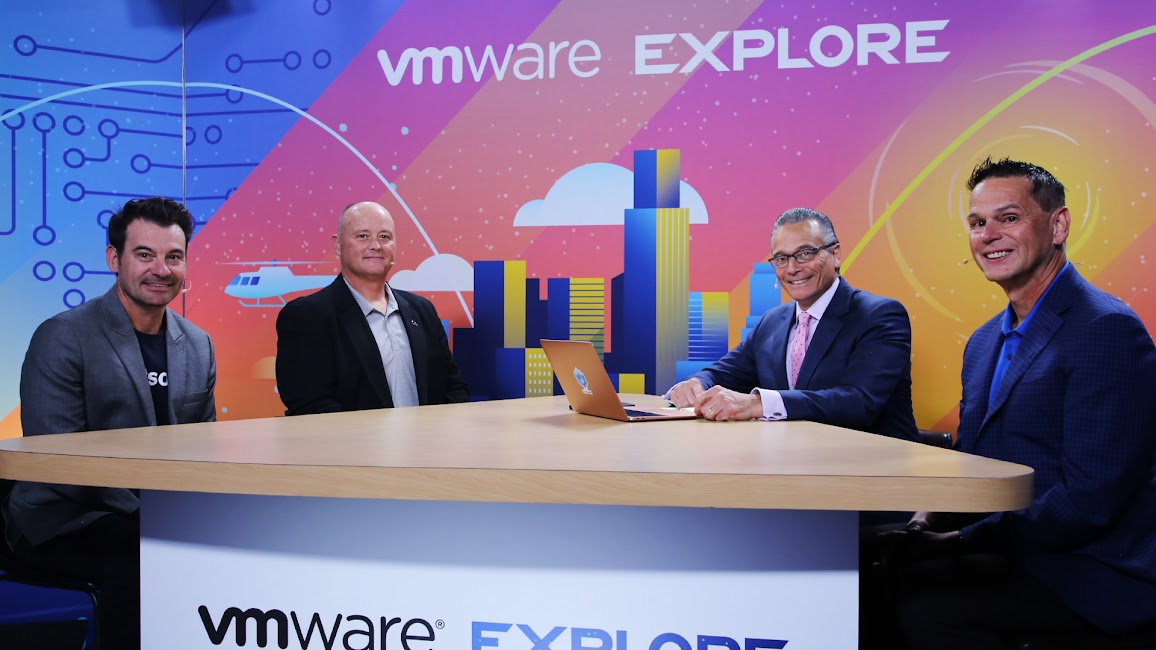 AI
AI
 AI
AI
 AI
AI
The VMware Explore gathering in Las Vegas this week included discussion of how to manage the integration of data in IT infrastructure for hosting artificial intelligence-based workloads throughout the stack.
This will impact operations in a number of areas, including cybersecurity. Earlier this year, IBM Corp. scientists developed new techniques for scanning and measuring the entropy, the randomness or disorder, of data as it arrives inside a flash array to find evidence of malware. The goal is to get ahead of the curve as more organizations embrace AI for key operations.
“As businesses try to operationalize AI, you’re going to see more focused repositories of data where the information that they’re using to train the model are going to be verified and validated for accuracy and veracity — and maybe even monetized in terms of relevance to the business itself,” said Scott Baker (pictured, second from left), chief marketing officer and vice president of infrastructure portfolio product marketing at IBM. “Those become the new attack surfaces that ransomware will go after, because I don’t have to take the large language model down to have as evil an effect if I could just inject bad data into that. At IBM, our focus is: Don’t just host the AI; bake the AI into the actual infrastructure itself.”
Baker spoke with theCUBE industry analyst Dave Vellante (second from right) at VMware Explore 2023, during an exclusive broadcast on theCUBE, SiliconANGLE Media’s livestreaming studio. He was joined by Brandon Mann (left), product management leader for Storage Fusion at IBM, and Pete Brey (right), global product executive at IBM. They discussed IBM’s approach to AI and the technology’s potential impact on IT operations. (* Disclosure below.)
IBM’s focus on baking AI into the infrastructure can also be seen in recent announcements surrounding watsonx, which officially launched in July. It encompasses AI-based applications and tooling for model lifecycle management and governance.
“With watsonx, we have a huge aspect of what we’re trying to accomplish from an AI for business aspect,” Mann said. “There’s a lot of excitement over generative AI overall, and it’s going to be a momentum shifter in the industry in general. From an infrastructure standpoint, we’re going to have a big part in it.”
Recent advances in generative AI could also have a significant impact on how enterprises run and manage multicloud. There is a potential for AI to let applications run on multiple clouds as a single global instance.
“It’s interesting how we might be able to use AI to work around some of the physical dimensions of just speed of light problems,” Brey said. “Being able to chop it up and take advantage of the hybrid cloud, the multicloud approach. I think that’s really the direction that things will head.”
AI-based applications could also have implications for edge computing as businesses seek new ways to process data at the source, away from datacenter or cloud environments.
“The moment you can collect that data and process it, that’s the key,” Baker said. “On-prem there’s absolutely no reason for any business to try to recreate the internet to have a large language model. That wouldn’t make any sense whatsoever. But I think what AI is going to do is it’s going to force higher degrees of data hygiene and responsibility for data onto people and organizations.”
Here’s the complete video interview, part of SiliconANGLE’s and theCUBE’s coverage of VMware Explore 2023:
(* Disclosure: IBM Corp. sponsored this segment of theCUBE. Neither IBM nor other sponsors have editorial control over content on theCUBE or SiliconANGLE.)
THANK YOU